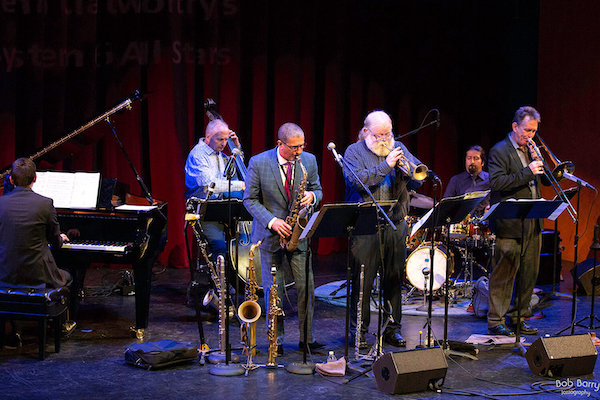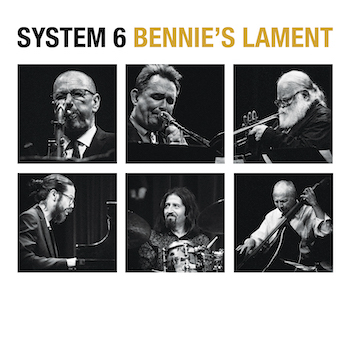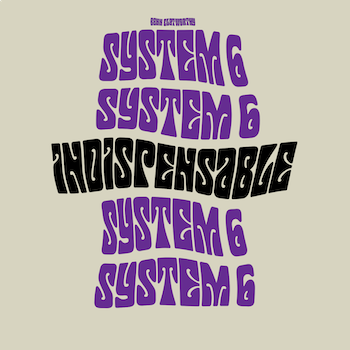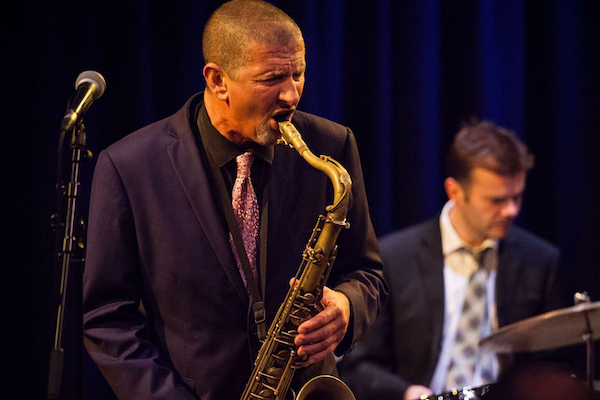Jazz Album Review: System 6 Goes Outside and Inside, Splendidly
By Brooks Geiken
System 6 is an adventurous contemporary ensemble whose music will appeal to lovers of the free jazz movement of the ’60s.

Benn Clatworthy and System 6 in action. Photo: courtesy of the artist
Over the past couple of decades it has been hard to find serious echoes of the ’60s free jazz movement in contemporary jazz recordings and concerts. Then last year, by chance, I happened to hear an exciting CD from a Los Angeles group called System 6. Here was a compellingly adventurous group, led by multi-instrumentalist Benn Clatworthy, that not only embraced the musical ethos of the ’60s, but added its own distinctive sonic spin.
The origin of System 6 can be traced back to conga drummer Francisco Aguabella’s Latin Jazz Band of the late ’80s. Clatworthy, pianist Bryan Velasco, and trombonist Joey Sellers were members of that group, keeping things going for a while after Aguabella’s death. Then, teaming up with trumpeter Ron Stout, System 6 was formed. The lineup was solidified by the addition of Yayo Morales on drums and percussion and Bruce Lett on bass. The troupe’s first album came along in February of 2020. The result was an auspicious debut entitled Bennie’s Lament. Clatworthy contributed nine compositions and they cover an impressively wide range of styles and rhythms.
 Clatworthy brings a wealth of jazz knowledge to his playing and his composing. With an astonishing degree of dexterity he performs on tenor and soprano saxes, clarinet and bass clarinet, flute and alto flute. His compositions have a marked individuality: you know it is his after hearing the first few bars. Take “The Decider,” the opening tune on Bennie’s Lament, for example. The horns play a repeating 10-note figure before Clatworthy comes in on tenor, mixing in some free jazz influences. Then Ron Stout slows everything down by supplying a thoughtful, probing solo on trumpet. The song “Terry Briggs,” written for a club owner who booked System 6 early on, is a beautiful ballad, a pleasing evocation of a man Clatworthy obviously admires. Another ballad pays homage to the composer Billy Strayhorn. The tune “Stayhorn’s Bag” is reminiscent of Strayhorn’s “Lush Life,” complete with a moving solo on piano by Bryan Velasco. The album ends with “The Pursuit,” a swinging composition with fine solos by Clatworthy, Velasco, and bassist Bruce Lett.
Clatworthy brings a wealth of jazz knowledge to his playing and his composing. With an astonishing degree of dexterity he performs on tenor and soprano saxes, clarinet and bass clarinet, flute and alto flute. His compositions have a marked individuality: you know it is his after hearing the first few bars. Take “The Decider,” the opening tune on Bennie’s Lament, for example. The horns play a repeating 10-note figure before Clatworthy comes in on tenor, mixing in some free jazz influences. Then Ron Stout slows everything down by supplying a thoughtful, probing solo on trumpet. The song “Terry Briggs,” written for a club owner who booked System 6 early on, is a beautiful ballad, a pleasing evocation of a man Clatworthy obviously admires. Another ballad pays homage to the composer Billy Strayhorn. The tune “Stayhorn’s Bag” is reminiscent of Strayhorn’s “Lush Life,” complete with a moving solo on piano by Bryan Velasco. The album ends with “The Pursuit,” a swinging composition with fine solos by Clatworthy, Velasco, and bassist Bruce Lett.
Tales From the Backyard is the second recording from System 6. According to the critic in a French jazz publication, the disc turned out to be “indispensable.” The title refers to the fact that during the pandemic the band rehearsed all the time in a member’s backyard. The musicians are the same as on Bennie’s Lament with the addition of new bassist, David Reynoso. “The Vegan” opens the record and the performance boasts Clatworthy on bass clarinet and soprano sax, a very noteworthy (pun intended) and stimulating combination. Yayo Morales dips hard into a Sonny Rollins-inspired drum groove on “Calypso Trisha.” The shimmering calypso beat is enhanced by Sellars’s trombone solo toward the end. There is a predictable evocation of mourning at the beginning of “Ballad for George Floyd.” Clatworthy dramatizes, musically, the horror of Floyd’s murder by the police. The tempo shifts on “WAFM,” with David Reynoso’s funky bass line followed by Stout’s keen trumpet. Clatworthy lets loose with a sprightly solo on tenor before Velasco displays his blues chops on piano. Tales From the Backyard ends with the uplifting “The Skipper Meets the Pharoah.” Clatworthy says that he wrote this for bass player Henry Franklin (also known as The Skipper) after Franklin asked him for a variation on a Pharoah Sanders composition. Clatworthy couldn’t write that piece, so he wrote “The Skipper Meets the Pharoah” instead.
 Of course, the next disc had to be called Indispensable and the title number contains some of System 6’s finest ensemble work. Clatworthy’s solo on the title tune attains a refined balance: it takes a “free jazz” peek outside and then comes back in. The payoff: when he solos we get to hear the best of both worlds. Each album has a ballad, and the mellow tune here is “Adam.” Clatworthy notes that the piece was written for a person who was a victim of gun violence. Bryan Velasco plays the Fender Rhodes piano and the instrument (an electric piano used extensively in the ’70s) gives the music a nostalgic feel. Clatworthy chooses the alto flute and goes on a thoughtful and probing excursion.
Of course, the next disc had to be called Indispensable and the title number contains some of System 6’s finest ensemble work. Clatworthy’s solo on the title tune attains a refined balance: it takes a “free jazz” peek outside and then comes back in. The payoff: when he solos we get to hear the best of both worlds. Each album has a ballad, and the mellow tune here is “Adam.” Clatworthy notes that the piece was written for a person who was a victim of gun violence. Bryan Velasco plays the Fender Rhodes piano and the instrument (an electric piano used extensively in the ’70s) gives the music a nostalgic feel. Clatworthy chooses the alto flute and goes on a thoughtful and probing excursion.
System 6 returns to its Latin jazz roots on the wonderful “Sound for Sonny.” José “Papo” Rodríguez jumps in playing the congas and he seems to inspire the entire band. Velasco even adds some lively montuno (Cuban piano riffs) into the mix. The winner of the most provocative title on the record is “Hey Man Hey Man That’s Not Cool.” Papo again excels on conga drums as does Sellars, whose trombone solo brings it all home. Perhaps the most interesting composition on Indispensable is Joey Sellars’s “Libertines.” Sellars, who contributes one composition per album, has outdone himself on this one. There are numerous shifts in tempo and mood; it is easily the longest and most complex song on the album. “The 2 Rights” rounds out the recording: the title refers to the right to bear arms and the right to be threatened by said arms. Velasco pumps those keys on the Rhodes as Clatworthy supplies some solo tenor gladness.
System 6 has been together for about 12 years and their experience together is evident: not only are these musicians fluent improvisers, but the ensemble playing is sturdy, powerfully cohesive. Clatworthy on tenor, Stout on trumpet, and Sellars on trombone make for a very potent jazz sound.
All three discs from System 6 have something in common — a number of their song titles have political resonances. “The Decider” is the dumb name George W. Bush called himself. “No Collusion” is a not-so-subtle dig at a former president. “Ballad for George Floyd” is a tribute to a slain Black man. Finally, “The 2 Rights” and “Adam” point to the absurdity of gun violence. But these messages are inevitably infused in high quality musical quests.

Benn Clatworthy in action. Photo: courtesy of the artist
Performance Note: System 6 will be livestreamed from The World Stage in Leimert Park Village on August 25 at 8 p.m PST. The World Stage is an educational and performance arts space founded in 1989 by master drummer Billy Higgins and community and arts activist Kamau Daáood.
Brooks Geiken is a retired Spanish teacher with a lifelong interest in music, specifically Afro-Cuban, Brazilian, and Black American music. His wife thinks he should write a book titled “The White Dude’s Guide to Afro-Cuban and Jazz Music.” Brooks lives in the San Francisco Bay Area.
